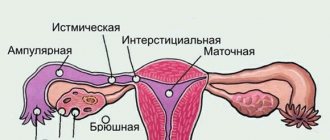Menstrual cycle and health
A woman's menstrual cycle begins and ends at the same period of time, provided the body is healthy. For most, the period lasts 28 calendar days; there are cases of 21 or 30 days. The cyclic period lasts for a healthy woman from three days to a week. If at this time there is an alternation of spotting and heavy discharge, they are inconsistent, often delayed, this all indicates that some kind of malfunction appears in the body, which may well provoke a cold. Why does it happen that menstruation is delayed due to a cold?
Menstruation after illness
The menstrual cycle is individual for every woman. Regularity directly depends on the synthesis of female sex hormones. The ovaries, adrenal glands and thyroid gland are responsible for their production.
Regulates the functioning of organs that produce hormones, the hypothalamus. Part of the brain is sensitive to any fluctuations in emotional background or lifestyle. Any negative internal or external factors, even minor ones, can provoke violations.
The characteristics of the menstrual cycle are presented in the table.
| Cycle duration | Normally it ranges from 21 to 35 days. The length of the cycle remains the same every month. A sharp change in duration requires consultation with a doctor. |
| Duration of menstruation | The duration of menstrual flow is 3-7 days. |
| Volume of discharge | During your period, 100-150 ml should be released. |
| Violations | Cycle disturbances are a physiological norm in the first year after menarche and at the time of menopause. |
Occasional delays are not a deviation. Seeing a doctor is mandatory when your period is late every cycle.
If there are frequent delays, you should see a doctor
The following factors influence the duration of the cycle:
- excessive physical activity;
- intoxication of the body;
- inflammatory processes;
- sudden change in diet;
- the onset of menopause;
- changing of the living place;
- pregnancy and breastfeeding;
- bad habits;
- sex life.
All of these factors in one way or another affect the performance of the female body.
Can a cold affect the delay of menstruation? Many people are interested. Critical days during acute respiratory viral infections and viral infections depend on the severity of the disease. In the case of slight weakness, with a slight sore throat, slight runny nose and cough, the changes will be small. Your period will probably come only two or three days later than expected. In the case of the presence of high temperature, strong stress on the internal organs, the nature of menstruation will change significantly.
In women this manifests itself as:
- Prolonged spotting. Failure of hormones affects the process of formation of the endometrium on the walls of the uterus and subsequent rejection. The event occurs unevenly. Discharge in the form of spotting is present before menstruation or several days after.
- Duration of critical days. When you have a cold or acute respiratory viral infection, your period may last longer than usual – up to 7 days. Heavy discharge is rare. Most often, during a viral infection, menstruation is scanty.
- Presence of blood clots. This situation is quite understandable and is not a pathology from a physiological point of view. When body temperature rises, the viscosity of the blood changes and its clotting process increases. The discharge turns brown even before leaving the vagina. In this case, the woman notices dark red clots on the sanitary pads.
- Painful sensations. This change is controversial. It would seem that an increase in the amount of toxins in a woman’s body during an acute respiratory viral infection should aggravate PMS, since intoxication affects the nerve endings and lead to severe pain. But in clinical practice, there have been cases when, along with weakness, headache, fever, pain from PMS was invisible against the general background. But all these processes always take place individually.
How many days can a delay in menstruation with a cold normally last?
ARVI and colds take away the vitality of the female body, affect the immune system, and weaken the protective functions. In such an environment favorable for harmful microorganisms, toxins accumulate and the number of pathological microorganisms increases. The infection can also cause hormonal disruption in the reproductive system.
After a mild form of a cold, menstruation comes 7 days later, and the cycle is extended to 35 days. If the delay is longer, then menstruation will have to be called. Since there is an infection in the body, this can provoke inflammatory processes in the pelvic organs. The consequences of the disease often include pathologies of the ovaries, appendages, uterus, and cystitis. In this case, the absence of menstruation is quite understandable. Other symptoms accompany changes in discharge:
- pain in the lower, center of the abdomen or on the sides;
- the appearance of nausea;
- increase in body temperature.
Symptoms depend entirely on the cause of the disease. Stress disorders or daily problems can aggravate the situation with cycle disruption:
- material difficulties;
- conflicts at work;
- unfavorable home environment;
- following a strict diet.
Since a woman’s immunity has weakened, it allows infections, fungi, and bacteria to enter the body. If you notice additional symptoms or experience more and more discomfort, you should immediately consult a doctor.
So, your period is late due to a cold, what should you do?
If your period is late for more than a week, this may be a symptom:
- abnormalities in the functioning of the endocrine system and thyroid gland;
- gynecological disorders including endometriosis, inflammation of the ovaries;
- disorders of the genitourinary system, i.e. cystitis, etc.;
- fungal disease;
- herpes;
- viral and bacterial infections.
A patient who consults a doctor in a timely manner will prevent the development of complications and get rid of assumptions and worries.
So, the menstrual cycle changes during a cold, the discharge does not start at a certain time, and it does not look as usual. It is important not to ignore the symptoms and treat yourself with great care. Be sure to focus your energy on maintaining the immune system and strengthening the body’s defenses.
We looked at whether there is a delay in menstruation due to a cold.
If you find that your usual menstrual cycle has been disrupted, do not panic. First of all, make sure that this is not pregnancy. If the test is negative, the delay may indicate minor disorders caused by the effects of influenza or ARVI. They are usually not very dangerous and can be eliminated relatively quickly.
Delay, test negative.
Flu. The norm is a failure in which menstruation is delayed no longer than 7 days. If the absence of menstruation continues for more than a week, there is a reason to consult a gynecologist. After collecting anamnesis and visual examination in the gynecological chair, the doctor will take samples of vaginal lubricant for laboratory testing.
Such an analysis is necessary in order to identify the presence/absence of an inflammatory process in the pelvic organs. It would also be reasonable to conduct a transvaginal or transabdominal ultrasound, which will help analyze the condition of the ovaries, fallopian tubes and uterus. These studies are aimed at identifying pathological processes in the pelvic organs that could be caused by influenza and ARVI.
Expert opinion
If after a missed period you experience excessive discharge that requires you to change your tampon or pad more than once an hour, consult your doctor immediately. This may be a sign of dysfunctional uterine bleeding.
Obstetrician-gynecologist of the highest category Oksana Anatolyevna Gartleb
To restore your cycle as quickly as possible, your doctor may recommend taking a course of restorative medications, as well as taking vitamin and mineral complexes. If there is a serious disorder associated with insufficient production of luteinizing and follicle-stimulating hormones, hormonal medications may be required.
If the absence of menstruation is accompanied by such signs of PMS as tearfulness, aggressiveness and irritability, it would be useful to take light sedatives or corrective non-hormonal medications. For example, you can take evening primrose oil “Gynocomfort”, which relieves these symptoms and helps normalize the menstrual cycle.
If a woman has a cold, a delay in menstruation can be combated not only with medications: it is extremely important to provide the patient with comfortable conditions for a speedy recovery and restoration of the menstrual cycle. To do this, it is recommended to eat a healthy and balanced diet, drink enough fluids, get enough sleep, try to be less nervous and breathe fresh air.
As for physical activity, it is recommended to refrain from doing excessive exercise. In this case, quiet activities aimed at improving blood circulation in the pelvic organs will be very useful. This could be doing yoga asanas or Pilates stretching exercises.
Gynocomfort evening primrose oil also helps to normalize the menstrual cycle, disturbed due to a cold. This remedy is a source of linoleic and gamma-linoleic acids, which have a beneficial effect on the synthesis of prostaglandins (Pg), and also regulate the excessive production of prolactin (Prolactinum).
As a result of systematic intake of evening primrose oil, inflammatory processes are reduced, the body's defenses are increased, and PMS symptoms disappear - breast engorgement, irritability and nervousness. In addition, evening primrose oil has antioxidant properties, which protects cells from free radicals.
Typically, the cycle of reproductive renewal is individual for each woman. Its regularity depends on the timely synthesis of hormones, for which the ovaries, adrenal glands, and the thyroid gland are responsible. This process is controlled by the pituitary gland. It, in turn, depends on the work of the hypothalamus, a very stress-sensitive part of the brain that ensures self-regulation of all body processes.
Why is there a delay in menstruation after the flu?
The female body is very fragile. Failure of the menstrual cycle can be caused by many factors, a delay in menstruation after the flu is one of them.
What is delay?
The delay is associated with disruption of the menstrual process and bleeding cycles. The normal cycle is 28-35 days. The menstrual cycle is so fragile that it can be disrupted for many reasons not related to pregnancy, when the absence of periods is considered normal.
Cyclicity deviations lead to serious problems and diseases of the female reproductive system. Functional processes in women under 45 years of age occur especially; the arrival of regular periods indicates that their work is coordinated, that fertilization has not occurred and there is no pregnancy. If the cycle is disrupted and there is a delay of more than 5 days, you need to find out its cause, visit a gynecologist and undergo the appropriate tests.
What is the connection between periods and the flu?
It is normal for your period to start and end at the same time.
Each woman has a different cycle duration, it depends on the woman’s body weight, age, and physiological characteristics of the body. Basically, the cycle is 28 days, but it can be 21, and even less often – 30-31 days. The duration of the cycle is 3-7 days. If this was the case, but suddenly your periods become irregular, scanty or, conversely, abundant, then you can suspect serious irregularities, and this is a reason to consult a doctor. A delay is quite possible even after suffering from the flu, but it should not be more than 10 days, this is how long the incubation period of the disease itself lasts. If your period still hasn't started after a week, it's time to sound the alarm. Any delay, regardless of the reason, should not be ignored; a woman must monitor her cycle and listen to her body.
A delay can occur as a result of a cold, change in weather, climate, or flu. Serious problems and various kinds of complications may be hidden behind it. Doubts and worries need to be put aside; timely diagnosis and treatment at the initial stage will help to overcome many obstacles on the path to a healthy, fruitful life, and will protect against the development of serious diseases leading to miscarriages and infertility.
How to understand that there has been a delay?
When delayed, the lower abdomen begins to ache. The same is observed at the beginning of pregnancy. However, pain is an abnormal phenomenon that is caused by some disorder of the woman’s reproductive system. Stress and poor nutrition have a negative impact on menstruation; the hormonal background of women is sensitive to acute respiratory viral infections and influenza.
Usually, after a delay, your periods are scanty, the blood has a different color, a different consistency, which is not at all normal. The reproductive system experiences dysfunction, the consequences can be very dangerous. If the delays are constant, ovarian dysfunction, polycystic disease, salpingoophoritis, and uterine fibroids may develop. With fibroids, the lower abdomen hurts, delays are constant, the stomach hurts before and after the arrival of menstruation. Spotting is observed at any stage of the menstrual cycle, becoming either heavy or scanty again.
If your period is 5 days late and your stomach hurts, then there may be a disease inside the body, and the pain is a signal to see a doctor.
If menstruation does not come and there is pain in the chest, there is a high probability of mastopathy, the formation and hardening of nodes in the mammary glands. A gynecologist or mammologist (for women over 35 years old) will help solve the problem. To prescribe tests, you must contact these doctors and undergo an ultrasound of the breast. Early diagnosis will prevent many operations, surgical interventions, to which women are so susceptible, especially those aged 40 years and older.
If the test is negative and there is a delay of no more than 2-3 days, there is no need to panic. If this happens for the first time and the cause is the flu, acute respiratory infections or a common cold suffered the day before, then the body will quickly recover and the menstrual cycle will return to normal.
What to do if there is a strong delay and a negative test?
Of course, any delay, regardless of whether there were previously colds, can be the cause of pregnancy.
In the first half of the cycle, observe changes in basal temperature. If it increases sharply, then this is the first sign of pregnancy. You need to measure the temperature correctly (with a regular mercury thermometer, not an electronic one). The procedure should be carried out immediately after sleep, without getting out of bed and inserting a thermometer no more than 2 cm into the rectum. If the temperature rises above 37 ° C, it may be pregnancy. Pregnancy can be determined by conducting a urine and blood test for hCG. A week after fertilization, a protein should appear in the tests, which confirms the fertilization factor. The fertilization of the egg can be determined already 6-24 hours after its fertilization. For this purpose, a blood serum test is performed. The presence of a certain marker may indicate early pregnancy, and the countdown begins from this day.
The role of the first sign of pregnancy is insignificant, since a fertilized egg may die after a few hours without reaching the uterine cavity. If it begins its development outside the fallopian tube, then this is dangerous for the woman and leads to an ectopic pregnancy.
Is it possible to induce menstruation if there is a delay?
To urgently induce menstruation, regardless of the reason for its delay, the following drugs are used: Postinor, Non-ovlon, Mifegin, Duphaston. All of them are not safe.
A woman's hormonal levels and endocrine system will be disrupted if they are used constantly. Menstruation eventually becomes irregular, and problems with conceiving a child begin.
Also, these drugs should not be taken in large doses, and it is best to consult a doctor before using them.
For vulnerable, emotional women, Pulsatilla will help normalize menstruation during amenorrhea. Use the product for a long time (up to 6 months).
Folk remedies for inducing menstruation:
- Blue cornflower (2 tsp) is poured with boiling water (1 glass), infused for 1 hour, taken orally 3-4 tbsp. l. in a day.
- The rhizome of a gladiolus, from the upper part of which a candle is made and inserted into the vagina. Your period arrives within a day.
- Onion peel, from which the decoction is prepared, drink 1 glass per day.
- Ascorbic acid. Take after meals in large quantities.
To enhance the effect, it is good to prepare a hot bath and steam thoroughly. It is not recommended to use this method for ulcers or gastritis.
A delay in menstruation for more than 5 days, even after suffering from acute respiratory viral infection or influenza, is considered a pathology, a deviation from the norm.
Hormonal disruption, weight loss due to illness, constant nervous tension, and an ongoing inflammatory process caused by viruses and bacteria may occur. If there is any delay, it is best to consult a doctor and undergo an ultrasound.
The only case considered positive is pregnancy. In all other cases, the delay leads to serious health problems, gynecological diseases, endometriosis, ovarian dysfunction, and uterine fibroids.
If the delay lasts more than 7 days and the test is negative, you should definitely visit a gynecologist. Eliminating the causes of delay at an early stage will give positive prognoses for maintaining the functionality of all female genital organs. Only a healthy woman remains energetic, attractive, seductive, and attractive to men's eyes. Be healthy!
respiratoria.ru
Everything is interconnected
During the menstrual cycle, a large number of transformations occur in a woman’s reproductive system under the influence of hormones. The main part of them is produced by the ovaries; they function together with various internal organs. Sex hormones are influenced by the hypothalamus and pituitary gland. During the menstrual cycle, shedding of the uterine epithelium occurs; this is preceded by many biological and chemical changes in the woman’s body.
Can a cold cause a missed period? Under some circumstances, the disease can significantly affect the cycle and pattern of discharge. After the virus enters a woman’s body, pathogenic microorganisms begin to multiply rapidly, leaving toxins in the tissues of the internal organs.
How can a cold affect your menstrual cycle?
It's no secret that the menstrual cycle directly depends on hormonal activity. In total, the following phases are distinguished:
- Follicular. During this phase, a follicle grows in the ovary, from which an egg ready for fertilization will subsequently be released. In total, several follicles begin to form in the gonad at the same time, but in the process of their growth, one (sometimes two) overtakes the rest, becoming dominant. “Unnecessary” follicles regress. The follicular phase takes up approximately half of the entire cycle (for example, 14 days in a normal cycle of 28). During this period, female hormones - estrogens - begin to be actively produced.
- Ovulatory. The dominant follicle begins to synthesize estrogens, stimulating the growth of endometrial cells. As the egg matures inside the follicle, an increased concentration of luteinizing hormone (LH) is observed in the blood. LH weakens the walls of the graafian vesicle, causing it to rupture. As soon as the follicle bursts, a mature egg is released, which passes through the fallopian tube directly into the uterine cavity.
- Luteal or corpus luteum phase. Having burst, the follicle releases the egg, and in its place a temporary endocrine gland is formed - the so-called corpus luteum. The corpus luteum secretes progesterone in large quantities, thereby preparing the endometrium for a possible pregnancy. This period lasts exactly as long as the corpus luteum “lives” - about 12-14 days.
Does a cold always cause a delay in menstruation? Of course not, because every person in the world is individual.
Illness is undoubtedly a great stress for the body. And stress can adversely affect the production of hormones, thereby disrupting normal functioning. Any infection that attacks our body can provoke both subtle and severe disorders. Viruses that multiply due to colds poison human organs with toxic toxins, thereby preventing the timely production of hormones and the occurrence of normal physiological processes in the reproductive organs.
And although most of the hormones in all 3 phases of the menstrual cycle are produced by the gonads, they work in close conjunction with other organs - the hypothalamus and pituitary gland. For example, a malfunction of the hypothalamus leads to a disorder in the pituitary gland, which can delay ovulation, and therefore menstruation, by about 7-10 days. The opposite also happens - due to the introduction of the virus, the egg is released much faster, and as a result, menstruation comes several days earlier.
Hello. I caught a cold about 2 weeks ago, now everything is fine. But now my period is 7 days late. I'm worried whether a cold could affect my menstrual cycle? (Maya, 28 years old)
Hello Maya. Yes, a cold can affect the delay of menstruation, but I cannot tell you that it is 100% the reason. To understand the problem, you need to visit a gynecologist and first do an ultrasound. Remember that any disruption in the normal cycle may indicate many pathologies.
What is the connection between colds and menstruation?
The disease is stressful for the female body. A cold can have a negative impact on the production of female hormones. Subtle or significant disturbances may appear.
Most often, with illness, a delay in menstruation of 3-7 days is likely. The medications taken also weaken the body. Protective functions are reduced, and the immune system needs to be restored.
Medicines taken for colds can affect your cycle
A cold can affect your cycle in the following ways:
- spotting alternates with copious discharge;
- the delay lasts no more than 7 days;
- there are dark blood clots, which are caused by an increase in body temperature;
- intoxication affects the nerves and the pain increases.
If a cold appears shortly before your period, PMS may not disappear after your period arrives. The symptoms of premenstrual syndrome will last longer. Additionally, the likelihood of diarrhea and nausea increases.
The nature of menstruation during a cold
A cold can not only cause a delay in menstruation, but also slightly modify it.
During the period of illness, a woman may experience:
- Spotting at the beginning of menstruation and after it ends.
- Change in the duration of menstruation. Menstrual flow during ARVI can drag on and last for more than a week. In this case, the saturation will be different.
- The presence of small bloody clots and their darkening. An increase in body temperature increases the thickness of the blood and, therefore, affects its clotting.
- Increased pain during menstruation. Intoxication affects the nerve endings, and this, in turn, provokes increased sensitivity during uterine contractions.
ARVI and the menstrual cycle
Any viral infection entering a woman’s body leads to hormonal imbalance. The hypothalamus is very susceptible to such infections. This is why problems with the menstrual cycle begin. Hormones can delay the onset of menstrual periods or speed them up. The presence of the disease does not mean that the organs of the reproductive system will be able to rest and menstruation will not occur in the current cycle, since the effect of toxins and the stress they create are not so strong. Is it possible to delay your period if you have a cold?
Colds on critical days
This happens, unfortunately, very often. A decrease in hormonal levels, the tone of almost all systems, anemia due to blood loss and weakened immunity are conditions when the body is unable to fight infection. It is very easy to catch a cold during your period.
It is even easier to provoke an exacerbation of chronic diseases such as bronchitis, tonsillitis and others. Even a runny nose that is harmless on other days can cause fatigue, an outbreak of herpes or inflammation in the genital area, which will certainly affect the functioning of the entire endocrine system and the ovaries in particular.
To prevent a significant disruption of the female cycle due to a cold or simply hypothermia during menstruation, you need to take into account:
- With a mild cold, even if a woman does not go on sick leave, she still needs rest and rest. You should not continue to work with the same load as on normal days. Anxiety and stress should be kept to a minimum.
- In case of a more serious illness, it is necessary to inform the doctor about your “women's” days and strictly adhere to the appointments. Take only prescribed medications, as some antipyretic and anti-inflammatory drugs, such as aspirin, thin the blood and can cause heavy bleeding.
- This also applies to folk recipes, which are very popular in the treatment of colds. Decoctions of chamomile, ginger and others during this period will also cause unnecessary blood loss.
What are the reasons for the delay?
Most often, periods are absent for 5-7 days with:
- viral infections during an epidemic;
- respiratory diseases;
- bacterial and fungal infections.
In any case, if there is a delay, you need to check for pregnancy.
A delay can occur even when it seems that the disorder has not affected the body in any way and the condition is generally satisfactory. If you don't have your period, rule out pregnancy. In the early stages, the state of health deteriorates greatly and the woman thinks that she is getting sick. If you are late, purchase and use a pregnancy test.
The absence of menstruation is not always associated with a cold. Provoking factors also include:
- regular stress;
- excessive physical and mental stress;
- long-term diets;
- under or overweight;
- breast-feeding;
- gynecological diseases;
- prolonged and thoughtless use of medications.
With the above factors, the delay is often more than 7 days.
A long delay may be due to gynecological diseases
The effect of a cold on the cycle
In each individual case, the disease can have a completely different effect on menstruation. An existing cold, namely a viral infection, can accumulate harmful toxins on the tissues of internal organs, which by their very presence can disrupt the hormonal balance and cause disruption in the menstrual cycle in many women. In this case, menstruation may begin either too early or not come for too long. In the absence of any serious violations, menstruation can be delayed for no more than seven days.
If menstruation has not begun since the beginning of the eighth day of delay, you should definitely contact your gynecologist.
If a viral infection is manifested by a runny nose, a sore throat and a slightly elevated temperature (up to 37.2), then before consulting a doctor, you should take a pregnancy test. This is due to the fact that the symptoms of the disease are often similar to the signs of pregnancy in its early stages.
It has its own effect on hormonal balance and prolonged hypothermia of the body, which can provoke inflammatory processes in the ovaries, appendages or uterus. In such cases, not only can the cycle go astray, but also uncharacteristic painful sensations in the abdominal area appear.
Too much deterioration in health with a delay in menstruation due to colds is a reason to contact a specialist and conduct detailed research.
Can there be damage to the urinary system?
Along with a cold, there is often an inflammatory process in the urinary system. The deviation affects the kidneys and bladder. This subsequently leads to delays.
Delay occurs with cystitis. If left untreated, the deviation leads to infection of the ovaries. The cycle is broken. The female reproductive organs are not synthesized properly. The bladder mucosa is easily injured. There is severe pain when urinating.
Chronic cystitis is difficult to eliminate. Any hypothermia leads to the growth of pathogenic microflora. A woman complains of a burning sensation when urinating.
Factors that influence the delay of menstruation during a cold
First of all, the nature of menstruation during the period of illness depends on the woman’s attitude towards her health. Most often, ladies suffer the disease on their feet, in which case the disruption of the menstrual cycle will be significant. Taking medications will also have an effect. During ARVI there is not always a fever; in this case, treatment can be limited to a throat spray or nasal drops.
All this, of course, can negatively affect menstruation and the nature of their discharge. The virus can greatly aggravate the situation with the menstrual cycle; there have been cases when menstruation had to be induced with special medications. But only a gynecologist can make such appointments.
What can you do if your period is late?
The main thing to do if you have a delay caused by a cold is to get treatment and rest, and avoid hypothermia. There is no need to endure the illness “on your feet”; it is better to take a sick leave and be at peace: on days of illness you especially want to sleep, and this is the body’s natural reaction to an infection.
During this time, intense physical activity and alcohol consumption are not recommended. It is necessary to ensure a flow of fresh air into the room, and also monitor humidity: lack of moisture contributes to the spread of colds.
You need to drink a lot of liquid - chamomile or linden tea with honey, tea with lemon, ginger, currants, raspberries, hot milk with cocoa butter, and also take vitamin C. To prevent the development of sore throat, you need to rinse your mouth and throat after eating (with chamomile decoction, for example). ), brush your teeth more often.
The female body is strong and fragile at the same time. His work is influenced by many circumstances, and in the most unexpected ways. It would seem, what does a viral disease have to do with menstrual dysfunction? But periods with the flu can become unrecognizable. They are often delayed if a woman has had an infection. And the flu itself, if it coincides in time with critical days, is treated a little differently.
Read in this article
When should we see a doctor?
As we have already figured out, a delay in menstruation can be caused by several reasons, including a cold. If it lasts more than a week, then a consultation with a gynecologist is necessary. In this case, the doctor prescribes tests:
- general blood and urine analysis;
- thyroid hormones, sometimes ultrasound of this organ;
- examination of the kidneys and bladder;
- Ultrasound of the pelvic organs;
- vaginal smear, bacterial culture of discharge.
Visit your doctor if you miss your period for 7 days or more. The doctor will make a diagnosis after an examination. It is recommended to check the condition of the uterus, tubes and ovaries. Ultrasound diagnostics is used for this.
Diagnostics helps to identify complications that could develop as a result of a cold.
How will taking antibiotics affect the female cycle?
Can there be a delay due to taking antibiotics when treating a cold?
Drugs that have a negative effect on the growth of living cells, of course, harm not only the pathogenic microflora, but also the natural one, necessary for many important processes for the body, and also affect the activity of all systems, including the hormonal one.
Much more detrimental to health is a rapidly developing infection, the consequences of which are painful and difficult to cure.
To avoid unnecessary stress on the body when treating ARVI, you need to keep in mind:
- You cannot take antibiotics without identifying the cause of the disease. The influenza virus is immune to antibacterial drugs used to treat other infections. Sometimes allergic reactions can be confused with cold symptoms. You should not cause unnecessary harm to an already weakened body by self-medicating.
- If you feel better before the end of the course of antibiotic treatment, you should not stop taking the prescribed medications. An untreated infection can become chronic. And insufficient exposure to antibiotics contributes to the development of resistance to it.
- When taking antibiotics, you need to remember about the manifestation of fungal microflora. Without the restraining factor of the natural bacterial environment, it begins to develop rapidly in the intimate area and causes inflammation. Regular hygiene and timely administration of antifungal agents are necessary.
Having a cold increases the risk of unwanted pregnancy
If your period is delayed after a cold, flu or exacerbation of a chronic disease, you first need to check whether pregnancy has occurred. The probability of detecting it after illness in the first phase of the cycle, when using the calendar method of contraception, is very high. This happens due to a shift in the timing of ovulation and with it all the usual rhythms. The period of safe days for unprotected sex comes later, and the possibility of getting pregnant increases significantly.
Active treatment with antibiotics or other drugs that affect the state of the body's microflora reduces the effect of hormonal contraceptives. They simply do not have time to be absorbed due to disruption of the intestines. Also, some drugs effective against ARVI or influenza suppress their contraceptive properties. It is better to use other means of contraception during illness and after it.
Possible consequences
On average, a woman's menstrual cycle lasts 28 days. This value is used to calculate the gestational age and time of ovulation. Individual characteristics of the body may explain the variation in cycle duration from 21 to 35 days. The norm for a missed period is 3-5 days of no bleeding after the expected period.
Such fluctuations in the menstruation schedule are observed in every woman, but they are not associated with any pathology. Usually the cycle is restored within the next month.
A delay in menstruation is considered normal in cases associated with hormonal changes.
These include:
- The period after the first menstruation and before menopause. In young girls, the cycle is established over 1.5-2 years. During this period, delays of up to 6 months are possible. In the premenopausal period (40-50 years), the absence of menstruation is associated with a decrease in the production of sex hormones: progesterone and estrogen. Reproductive function fades. Delays can increase gradually or be spasmodic (2-4 months without bleeding). This period lasts about 6 years.
- Taking hormonal drugs. Canceling oral contraceptives and taking two courses of pills without a break cause a delay in menstruation.
- Postpartum period. A large wound forms in the uterus due to the separation of the placenta. Normally, bleeding continues for 1.5-2 months, constantly decreasing. Often the menstrual cycle resumes immediately, but in some cases it takes the body 2-3 months to restore it - this is also a variant of the norm. To make sure that no infection or inflammation has developed, you need to visit a gynecologist.
- Lactation. Lactation in a woman’s body is maintained with the help of the hormone prolactin. It also delays the onset of ovulation and menstruation. The more often a woman breastfeeds, the more milk is required and the more intense prolactin is produced. Most often, periods are delayed for 3-6 months, but they may be absent for 2-3 years (the entire lactation period).
- Abortions and miscarriages. These conditions are accompanied by hormonal imbalance, and therefore may be accompanied by a delay of menstruation by 10-14 days. If you miss your period for a longer period, you should consult a doctor, as complications are possible.
- Anovulatory cycle. A month in which the egg does not mature may be accompanied by a delay of menstruation by 3-5 days.
There is an opinion among girls that menstruation may be delayed after the cycle in which the first sexual intercourse occurred. In fact, if pregnancy has not occurred, there is no reason for a long, more than 3-5 days absence of bleeding. A slight disruption in the schedule can be caused by a stressful condition.
The main reason for missed periods is pregnancy. To ensure its occurrence, you need to take a blood test for hCG levels or, as a last resort, use a test. Menstrual flow stops for at least 9 months (if you stop breastfeeding).
What could be the reason for a missed period without pregnancy?
The most likely situations are:
- gynecological diseases such as fibroids, cysts, cervical cancer, endometritis, endometriosis, adenomyosis, genitourinary infections;
- procedures that damage the walls of the uterus (curettage, hysteroscopy, etc.)
- incorrectly placed intrauterine device;
- ovarian diseases such as polycystic disease and scleropolycystic disease;
- prolonged stress, nervous tension, frequent conflicts;
- physical overload;
- severe dietary restrictions, diets, fasting;
- obesity or underweight;
- intoxication (alcohol, drugs, tobacco).
Thus, there are many reasons for a missed period. To determine what exactly caused the cycle failure, you need to seek medical help.
Diagnostics
The doctor may order a woman a number of tests, the choice of which depends on how long the delay in menstruation lasts and whether it is accompanied by other symptoms.
The clinical conversation and gynecological examination are complemented by:
- general blood test and to determine the level of hormones - hCG, estrogen, progesterone, gonadotropins, prolactin;
- Ultrasound of the pelvic organs - detection of pregnancy, tumors of the uterus or ovaries;
- CT and MRI - if tumors of the pituitary gland or ovaries are suspected.
If any non-gynecological diseases are detected, the woman is referred for consultation to specialized specialists: an endocrinologist, nutritionist, psychologist, etc. They determine the need for further diagnosis.
Treatment
Treatment of delayed menstruation comes down to eliminating the factors that cause it.
In some cases, it is enough to change your lifestyle: balance your diet, select an activity appropriate to your level of physical fitness, normalize your weight, get enough sleep.
If the reason is a violation of the emotional state, prolonged stress, then it is worth visiting a psychologist or psychotherapist and master the skills of self-regulation and relaxation.
When the cause of a delay in menstruation is a gynecological disease, a complication after an abortion, surgery, or invasive diagnostics, then special treatment cannot be avoided. Anti-inflammatory and painkillers, antibiotics, as well as hormones, in particular progesterone, are prescribed. In some cases, surgery may be required, for example for tumors.
Consequences
A delay in menstruation is especially dangerous if it is caused by gynecological or endocrine diseases. Thus, disturbances in the production of prolactin lead to the development of malignant neoplasms.
Inflammatory processes can become chronic and cause infertility. Infectious diseases, if not treated promptly, spread to nearby organs and can also lead to sepsis (blood poisoning).
To eliminate the risks of such consequences, it is necessary to detect a delay in menstruation as early as possible and establish its cause.
Prevention
To prevent a delay in menstruation, you should adhere to the following recommendations:
- lead a healthy lifestyle (healthy nutrition, moderate exercise, adequate sleep, quitting smoking and alcohol);
- undergo a preventive examination by a gynecologist every six months;
- promptly identify and correct hormonal imbalances;
- if you do not want to have a child, use reliable contraception;
- take hormonal medications only as prescribed by a doctor.
It is possible to induce menstruation if there is a delay only if the cause does not require treatment: the establishment of the menstrual cycle in adolescence, acclimatization, etc. If therapy is required, then it will not be possible to restore the cycle without basic therapy.
To ensure that menstruation begins on time, traditional medicine recommends drinking teas with the addition of chamomile, valerian, mint, oregano, and onion peel. Parsley, lemon, and lettuce will also help speed up the normalization of your cycle.
In some cases, the doctor may prescribe a homeopathic remedy - Pulsatilla D200 grains. The drug affects the endocrine, immune and vascular systems.
For all women, the norm for a period delay is 3-5 days. But in some cases it can be increased to several months and even years (breastfeeding).
If there are disruptions in the menstrual cycle that go beyond the norm, you need to consult a doctor and determine their cause. Timely diagnosis and treatment will help avoid serious consequences of delay, such as malignant tumors and infertility.
Doctors also note that pregnancy can manifest itself as symptoms of a cold: sore throat, runny nose, nasal congestion, increased body temperature up to 37.2 degrees. In this case, a woman may confuse it with the onset of a cold. If the symptoms do not go away and the delay in menstruation continues, it is better to take a pregnancy test.
Period reaction to a cold
The viral infection “loves” the hypothalamus, which reacts sharply to it. After which a woman’s hormonal imbalance occurs. Most often this is expressed in insufficient production of luteinizing hormone.
And this can lead to and, as a consequence, a delay in menstruation and various types of discharge.
Can menstruation be delayed for a long time after ARVI?
In fact, a viral infection does not have such a large impact on the reproductive system to cause a prolonged delay.
The maximum number of days your period is late can be no more than 7 days. Anything exceeding the time limit may mean violations in another area or the presence of an interesting situation for the girl. That is why it is recommended that girls who have had a cold and are more than a week late have their pregnancy taken to refute or confirm conception. Based on the result, act.
How to restore a cycle
If there is a delay due to a cold, it is recommended to take vitamin complexes. This will increase the efficiency of the immune system. If a woman is overly anxious, then preference should be given to sedatives of herbal or chemical origin. For inflammation, antibiotics are prescribed. If your temperature rises, stay in bed and avoid hypothermia.
At normal temperatures, it is recommended to exercise. When you have a cold, it is better to give preference to light exercises or stretching exercises. This will help normalize blood flow, including in the pelvic organs.
When to see a doctor
The above phenomena refer to a delay in menstruation for a period not exceeding a week. The vast majority of delays can be caused by pregnancy. Therefore, to be sure, you need to take a test. And be sure to consult a doctor, because problems with menstruation are also a sign of the development of pathologies in the body.
The doctor usually prescribes the following types of examinations:
- UAC and biochemistry;
- hormone analysis;
- kidney examination;
- thyroid examination;
- Ultrasound.
In the absence of identified disorders and pathologies, efforts should be directed toward strengthening the immune system: take vitamin complexes, avoid stress, lead a healthy lifestyle, adhere to a proper diet, alternate physical activity with rest, devote enough time to sleep, dress for the weather, and avoid hypothermia.










